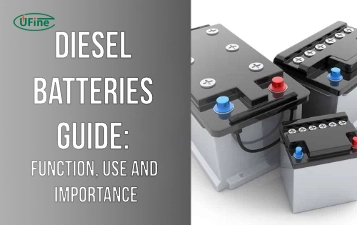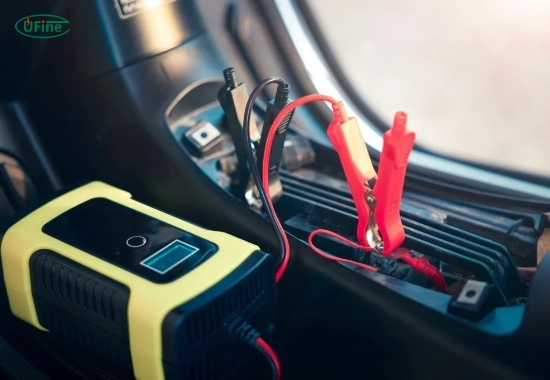If you’re wondering whether you can charge a car battery with a trickle charger, especially when that battery is a modern lithium type, you’re not alone. As lithium batteries become more common in electric vehicles and advanced car systems, many drivers ask whether traditional charging methods still apply. Trickle chargers have long been used to keep lead-acid batteries charged during periods of inactivity, but charging lithium batteries is a different story. The key lies in understanding the technology behind the battery and the charger.
This article will explore the compatibility between trickle chargers and lithium car batteries, discuss the risks and best practices, and provide a comprehensive guide to help you make the right choices when maintaining your battery.
Part 1. What is a lithium car battery?
Lithium car batteries are rechargeable batteries that use lithium-ion cells to store energy. They offer several advantages over traditional lead-acid batteries, including lighter weight, faster charging times, higher energy density, and longer lifespan. They are commonly used in electric vehicles (EVs), plug-in hybrids (PHEVs), and some new internal combustion engine vehicles that rely on advanced electrical systems.
Lithium batteries do not require regular topping up or maintenance, unlike lead-acid batteries. They also perform better in extreme temperatures and are less prone to sulfation, a common issue in lead-acid batteries. However, they are more sensitive to the type of charger used and the charging method applied.
Part 2. What is a trickle charger?
A trickle charger is a type of battery charger that delivers a very low and steady electrical current to a battery over a long period of time. The main purpose of a trickle charger is to maintain a battery’s charge when the vehicle is not being used. It is especially useful for cars, motorcycles, boats, or RVs that are stored for weeks or months.
Trickle chargers are often used during the winter season or during long storage periods to prevent batteries from discharging completely. By supplying a continuous low charge, these devices help ensure the battery is ready to go when the vehicle is brought back into use.
Part 3. Can you charge a lithium car battery with a trickle charger?
The simple answer is that you can charge a lithium car battery with a trickle charger, but only if the charger is specifically designed or programmed for lithium batteries. This is a critical detail that must not be overlooked. Most traditional trickle chargers are made for lead-acid batteries and use voltage and current settings incompatible with lithium battery chemistry.
Lithium batteries require a different charging profile, and using a standard trickle charger can lead to overcharging, overheating, or even permanent damage to the battery cells. Therefore, before attempting to charge your lithium car battery with a trickle charger, you must ensure that the charger supports lithium-ion technology.
Part 4. How do lithium batteries differ from lead-acid batteries in charging behavior?
One of the key differences between lithium and lead-acid batteries lies in how they accept and retain charge. Lead-acid batteries require a multi-stage charging process, including bulk, absorption, and float. Trickle chargers use the float stage to keep the battery full without overcharging.
Lithium batteries, on the other hand, do not benefit from the float stage. They follow a more straightforward charging method called the Constant Current/Constant Voltage (CC/CV). Once a lithium battery reaches its full charge, it should stop receiving current. Maintaining a continuous float voltage, familiar with traditional trickle chargers, can cause lithium batteries to heat up or degrade over time.
That is why using a smart charger that monitors the battery’s charge level and automatically stops when the battery is full is essential for lithium batteries.
Part 5. What happens if you use the wrong charger on a lithium battery?
Using a standard trickle charger not designed for lithium batteries can have serious consequences. The charging voltage may exceed the safe limit for lithium cells, leading to overheating, swelling, or, in extreme cases, thermal runaway. This condition can cause the battery to catch fire, leak, or explode.
Moreover, incorrect charging can significantly shorten your battery’s lifespan. Lithium cells are sensitive to both overcharging and deep discharging. When you use an unsuitable charger, you risk damaging the battery’s internal structure, which affects its ability to hold and deliver charge over time.
In summary, the risks of using an incompatible trickle charger include:
- Permanent damage to battery cells
- Reduced battery performance
- Fire or explosion hazards
- Voiding manufacturer warranties
Part 6. What type of charger should you use for a lithium car battery?
To safely charge a lithium car battery, you need a charger explicitly designed for lithium-ion chemistry. These chargers are often called smart chargers or lithium battery maintainers. They come equipped with microprocessors that monitor the battery’s voltage, temperature, and charge level.
Smart chargers for lithium batteries provide the correct voltage and current and stop charging automatically when the battery is full. Some models even offer temperature compensation features to prevent charging in unsafe conditions.
Several reputable brands manufacture lithium-compatible chargers, including:
- NOCO Genius
- Battery Tender Lithium
- CTEK Lithium XS
- OptiMate Lithium
When shopping for a charger, always check the specifications to ensure it lists compatibility with LiFePO4 or lithium-ion batteries.
Part 7. Can you leave a lithium battery on a trickle charger for a long time?
This is a common question among car owners who store their vehicles for extended periods. The answer depends entirely on the type of charger being used.
If the trickle charger is not lithium-compatible, leaving the battery connected for a long time is unsafe. It can lead to overcharging and damage. However, if the charger is a modern smart charger with lithium settings and automatic shut-off, it is generally safe to leave it connected.
Still, best practice suggests periodically checking the battery and unplugging the charger once it is full. Even the best chargers can malfunction, and regular inspections help ensure safety.
Part 8. How to properly maintain a lithium car battery during storage
If you plan to store your vehicle for several weeks or months, it’s essential to take steps to preserve the battery’s health. Here are some tips:
- Charge the battery to about 50 to 80 per cent before storing. Lithium batteries do not need to be stored at 100 per cent.
- Disconnect the battery from the vehicle to prevent parasitic drain from onboard electronics.
- Store the battery in a cool, dry place away from direct sunlight or high humidity.
- Use a lithium-compatible battery maintainer if you leave the battery in the car.
- Avoid deep discharges during storage, as lithium batteries do not tolerate being fully drained.
Following these steps can help extend the life of your lithium car battery and ensure it performs well when you need it.
Part 9. Are there alternatives to trickle charging for lithium batteries?
Several alternatives exist to using a trickle charger to maintain your lithium car battery. One popular option is a battery maintainer or battery tender. These devices are similar to trickle chargers but are smarter and safer for lithium batteries.
Another option is to use a solar charger that has lithium support. These devices are handy for outdoor vehicles, as they draw energy from the sun to keep the battery topped up.
You can also charge the battery thoroughly before storage and disconnect it. Lithium batteries have a very low self-discharge rate, so they can hold their charge for several months without needing a charger.
Part 10. FAQs about lithium car battery charging
Can a regular trickle charger be used on a lithium car battery?
No. Regular trickle chargers are typically made for lead-acid batteries and do not support the charging needs of lithium batteries. Always use a charger that is made explicitly for lithium-ion chemistry.
What is the best charger for a lithium car battery?
The best charger has lithium-specific settings, automatic shut-off, temperature monitoring, and smart charging modes. Brands like NOCO, CTEK, and Battery Tender offer reliable options.
How long does it take to charge a lithium car battery?
Charging time depends on the battery capacity and the charger’s output. It may take 1 to 6 hours to charge a lithium car battery with a compatible charger fully.
Is it safe to leave a lithium battery on a charger overnight?
It is recommended only if the charger is designed for lithium batteries and includes safety features like auto shut-off; otherwise, it is not recommended.
What are the signs of an overcharged lithium battery?
Common signs include swelling, overheating, reduced performance, and, in severe cases, leaking or smoking. If you notice these signs, disconnect the battery immediately and seek professional help.
Related Tags:
More Articles

Diesel Batteries Guide: Function, Use and Importance
Diesel batteries power heavy-duty engines with high energy needs. Learn how they work, their types, and why they’re vital for diesel systems.
What Are Quantum Batteries? The Future of Energy Storage Explained
Quantum batteries use quantum mechanics to charge faster and more efficiently, offering a glimpse into the future of advanced energy storage.
What Is a Quadruple Battery? Explained for Modern Power Systems
A quadruple battery combines four units into one system for higher capacity, efficiency, and reliability in EVs, solar, and backup power setups.
How Many Volts Is a Lawn Mower Battery?
Most lawn mowers use 12V batteries, but some range from 6V to 80V. Learn how to check, choose, and maintain your lawn mower battery voltage.
How Much Does a Tesla Battery Weigh?
Tesla batteries weigh 900–1,800 lbs depending on the model. Learn why battery weight matters and how it impacts performance, range, and efficiency.





